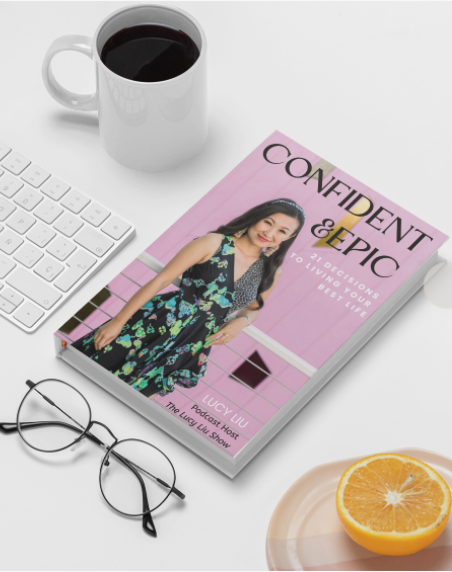260. Growing a Business to 7-Figures with Brynn Snyder of SLATE Flosser
This episode is for you if you want to learn from the wisdom and mindset from Brynn Snyder, the 7 figure co-founder and CEO of Slate Flosser.
LISTEN TO THE PODCAST
WATCH THE EPISODE
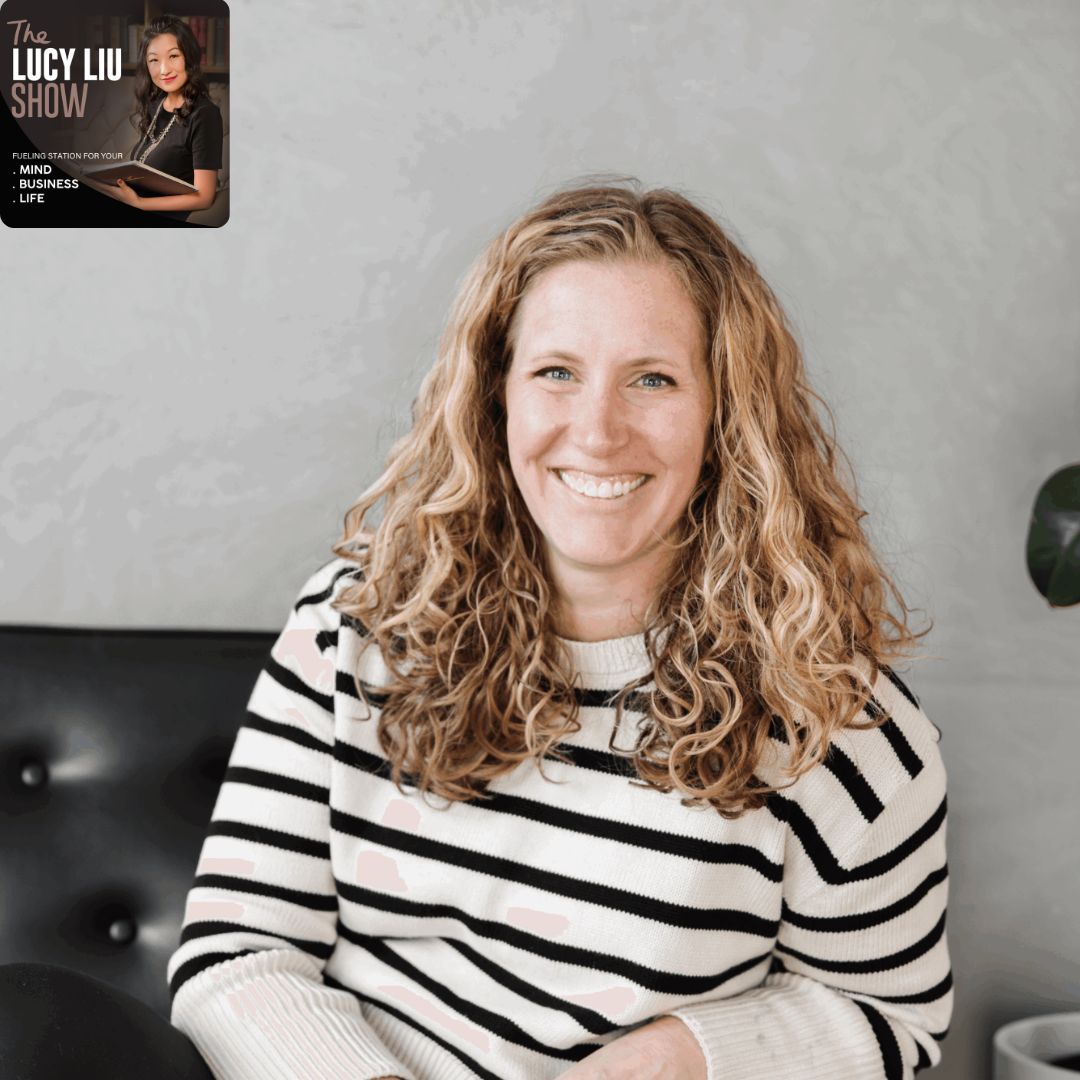
Checkout SLATE Flosser:
Connect with Lucy:
Instagram: https://www.instagram.com/mslucyliu
Facebook: https://www.facebook.com/mslucyliu
Twitter: https://www.twitter.com/mslucyliu
LinkedIn: https://www.linkedin.com/in/mslucyliu
TikTok: https://www.tiktok.com/@mslucyliu
YouTube: https://youtube.com/@mslucyliu
Website: https://www.lucyliucoaching.com
Podcast: https://www.lucyliucoaching.com/podcast
Wanna double your confidence in 30 seconds?
Get the ultimate secret here:
FULL EPISODE TRANSCRIPT
Hello, hello, beautiful souls. Welcome back to another episode. And I’m so excited to be here with you to share the mindset of another seven figure business owner.
And I’m excited to welcome my guest, Bryn Snyder, co founder and CEO of Slate Flosser. Welcome to the show, Bryn.
Thank you so much for having me. I’m so excited to be here. And I hope that I can help someone else not make the same problems I made.
It’s beautiful. I actually was gifted a set of Slate Flosser and it was sitting in my drawer for a whole year before I opened it. And the first time I used it, I was like, Oh my goodness, why did I let this sit in my drawer for a whole year?
It is absolutely amazing. So I love your product. Actually, I’m a big fan.
Well, thank you so much. I actually we’ve noticed that if someone’s gifted it, sometimes they’re like apprehensive to use it. But we’re trying to figure out how do we make this more approachable and more exciting because once people use it, they’re like, Oh my gosh, this is so easy.
Because we’re so conditioned to use a good old floss, right?
Or not use but you know, there’s some people who do use it.
Awesome. Okay, so obviously, you’ve gotten to where you are, because we have these beliefs. And early on in your business, what do you think you had to unlearn to get you to where you are today?
Oh, that’s a hard question. So I actually grew up as an entrepreneur. So I was lucky enough when I was 13.
My mom helped me start a business. And anytime I’d have questions, I’d ask her and so I was really fortunate to, I think I made a lot of mistakes then. So with Slate, I think the thing that was probably the biggest thing I had to unlearn was profit margins need to be higher.
We obviously all want to offer our product at the best price possible. But you have to make money in order to be a business. So we did a Kickstarter and our profit margins were not high enough.
And so when we came out with our product, we had luckily learned that so our profit margins we increased.
Okay, and along the way, when these are not working out great, I envision that there might be some self doubt that creep in some imposter syndrome, right?
So luckily, I have a therapist. So anytime I feel like I have self doubt or frustrated with something, it’s nice to have another person be like, wait, you felt you you were a failure, but you didn’t fail. Like at last year, my goal was to do three and a half million dollars.
And that’s our second year in and I was like, okay, but we actually beat that goal. And when we were when we knew we were going to beat it, I’ve made a bigger goal. And we didn’t hit the big, big goal.
And I was like, so sad. And they were everyone reminded me like Britain, your first goal was 3.5. And you beat that. So you need to be happier.
And I just think as an entrepreneur, sometimes we set the bar, we just keep putting the bar higher and higher instead of being like really happy with our success that we’ve achieved.
Such a great reminder. As a matter of fact, I just got off of another call, which is the monthly workshop I hold called I am remarkable. And it’s where we practice saying how much we accomplished, because that’s what we want to focus on.
There’s no too small, right? There’s right. There’s always room for improvement.
Yes. But look how far you’ve already come. Look how much you’ve already accomplished.
And it’s a great reminder, especially for women, that you are remarkable and just focus on what you have already accomplished.
I totally agree. I think that would be such a beneficial class, because we almost every month, I have to remind myself like, Okay, we did all these amazing things this month, Bryn, we got this. And it’s good to have the team there.
Because otherwise, you just always feel like a failure. You got to remind yourself what you’re doing. That’s awesome.
What do you think are the small habits and or rituals? Because I believe all the smaller habits added up make the biggest impact on our growth journey. So what are the small habits you think that made the biggest impact in your personal or business growth?
So we always have goals. And I think that habit of having an achievable goal is really important. I always want to make them be achievable goals, because I don’t want to always feel like I’m failing.
So making projections that I feel like I can achieve in every at the beginning of every month, I let everyone on our team know what our goal is. And then in the middle of the month, we kind of do a check in and see like, do we need to adjust our goal? Like, oh, sales are going way faster, we actually need to up our goal or sales are way down what what external components are causing that.
So we do and now I can’t remember the acronym, but it’s like a SWOT assessment after big launches or different things. And we say like, what went right, what went wrong. So I just think goal setting is probably the best habit that we have, because it helps us all be on track and know what we’re doing right and wrong.
But I think it’s okay to not hit a goal too. So we set the goals and when we don’t hit them, we ask ourselves why. But I think goal setting is my favorite habit.
And then delegation is the hardest thing to do, but the most important thing to do. So every month we get either a new employee or a new thing that changes and you have to learn how to delegate or you’re going to get burnt out.
I love it. Goal setting is something I love talking about as well. If you don’t accomplish your goals, that means you have to chunk down your goals further, you have to get detailed, make it smaller, and it’ll become inevitable that you accomplish your goals.
Yes. Okay, Brian, can you share a time when you faced a major setback or failure in your business?
Which one? I think so when we first developed our product, we had some manufacturing issues and we were trying to get our product out because we had run a Kickstarter and our product didn’t come out for another six months because of issues. And it was so, so frustrating.
And if you don’t have product to sell, you can’t make money. And I just felt so stressed out. And I was just seeing our bank account go lower and lower.
And I remember I was laying in bed and I was like, how am I going to do this? And instead of quitting, I was like, okay, let’s figure out how am I going to do this? So I think that when we hit failure, you need to ask smarter people than you and have a positive outlook on how can I fix this?
Because I just went and I found people who I really trusted. And I said, this is my situation. How do I work on this?
And then they’re like, okay, a product doesn’t have to be perfect, but it has to be really great. So I think there’s this fine line in a product development where you need it to be really great. But perfection is going to take you too much time to get to.
So understanding that 90% is better than 100%, which I wouldn’t have ever thought before.
And that leads right into my next question, which is so you need to bounce back, right? There’s always feelings of doubt or feelings of giving up when these setbacks arise. What what’s going on in your mind?
What mindset do you remind yourself? How do you bounce back?
So I am lucky. I have a very positive attitude normally. And I usually speak to myself very kindly.
So I am lucky because I have, I have five kids and I can see some of them don’t speak as kind to themselves as others. So I am lucky in that way that I don’t dwell on the negative. And I just think, okay, how do I move forward?
And, and I usually, maybe to my detriment that my therapist would say is sometimes I don’t feel as much as I should. I just like go into like logic production mode. But I would just say to people like, we need to be so much nicer to myself.
I see how one of my daughters speaks to herself. And if I could just tell her what I think about her, I always like, I do say to them sometimes, like the way you think about others, you should think about yourself. And so my sisters tell me I can do anything.
And I’m like, you’re right. Like, let’s do this. I can.
I love what you said about taking your daughter in a positive way, because that’s a ripple effect into our society. And growing a business with a big family is tough, right? But you’ve worked hard, and you should be proud of what you have accomplished.
That is amazing.
It is a lot of work.
I’m sure there are a lot of tough decisions along the way, right? Definitely. How did you push through when you had to make a tough decision?
I kind of when I have tough decisions, sometimes they cause you to have so many sleepless nights, like or for instance, like letting someone go that’s always so hard because you like love or I usually like love all my employees. And so letting someone go is usually so hard for me. And I think you just you have to go into it prepped and ready because tough decisions, no matter what they are, just stress you out.
And so if you if you go into them prepared, it’s a lot easier to follow through with what you’re going to do. So with tough decisions, I like to make sure I’ve created a good plan. And sometimes I’ll ask a trusted advisor on like, okay, this is what I’m doing.
Is this a good decision? And then once I’ve made that decision, that it’s a good decision, I just, I try to get it done as fast as possible. For instance, like if you are no, you’re gonna let someone go and and you wait a whole month, that means you had a whole month of bad sleeping.
But if you would have done it the second day, like just get this stuff done.
I love it. And I love how you have help. You said you work with the therapist that support is amazing, right?
Oh, so so beneficial. What is what would you say was your therapist’s favorite advice to you?
Trust my gut. Most of the time, like, I know what I need to do. I just need to do it.
That is so true. We as women, we are always waiting for a new sign. We’re waiting for external validation.
We’re waiting for I don’t know, we’re just never ready. So I love that advice a lot. What do you think is something about growing a business to seven figures that no one talks about?
super lonely and super hard. And so because of that, I will, especially as a woman, I feel like you have to put yourself in social circles, you have to make the time you have to network. I don’t think my business could have grown as fast if I wouldn’t have spent the energy and time networking.
I felt so lonely. So I went and I looked and I found a female founders group of other females and I went on a vacation with them. I got to know them and they became a great support to me.
I also do network events in my own city because there’s not a lot of CPG or women businesses in my city yet yet because we’re going to be there soon. I go to networking events with men and I have to just realize that they can be some of your biggest assets. So strategize with them and learn from them.
That is very true. I’m glad you found your circle. And I’m glad that you’re here to tell us that that circle is really important that people around you, right?
They say you become the you become who the five closest to you are. And so if you want to be a founder, get a surround yourself with founders, you want to be that version of you that higher version of you, make sure you are surrounded with positive people like that.
Yeah, when I actually joined the group, you were supposed to make a minimum of $2 million. And I was at like 100,000. And I just said, please, can I come I really benefit from this and they let me come and I would never have thought I could do $1 million that year.
And I did. And I felt like it was because I figured out what they were doing. And they and they people want to help you.
Most people want to help. So just ask.
Yes, that’s so true. I want to help everyone, every stranger I’m going to smile to and if they ask me a question, I want to help them. We want to give back to society we want to give to others.
I think it’s genuinely really beneficial for all of us to grow together. So that is great advice as well. And you did mention there’s a lot of mistakes along the way.
So from what you see, or what you hear, what do you think are some most common mistakes from other founders that you’ve seen?
I think thinking that virality is going to make us money. I think we see that that can happen and like, oh, they got this break or that break. But the most important thing I think in a business is consistency.
If you consistently do stuff, you will catch a big break. It’s like my mom always used to say, like, the harder you work, the luckier you get. And I totally agree with that.
Like, the people who have things that go well, it’s because they’re, they’re doing the same things over and over again.
Yes, yes. Virality is only overnight, but consistency is okay, Brynn’s business is doing well. I’m going to buy her flosser.
Yes, exactly.
So I think virality is amazing if you can get it to happen. But like, I remember I paid an influencer to do something for me because she had a lot of followers and it was, it was the biggest waste of money. And I was just like, it’s, it’s hard.
I think influence, I’ve seen influencers work and I have paid influencers that work, but typically I have them show me that they can make the money first before paying.
Great reminder. And you mentioned working with the influencers. So there are all these opportunities, right?
Even just when you have a business, it doesn’t matter what type of business, you’re going to get DMs, you’re going to get emails, like pitching you all these opportunities left and right, right? Like for me, I’m an author, I’m a speaker. So every single day, I’m getting these DMs about talks, like, or features in the media, just loads of opportunities.
But of course, we know, you know, to say no to those paid opportunities. How about for you, Brynn? How do you know when to say yes or no to an opportunity for you?
It’s so hard. It’s so hard. I think you can tell what I’ve started to learn is, is like, it only works if people genuinely love my product.
So if people don’t genuinely love my product, I don’t want to work with them. Like, I don’t care how big they are, how cool they are. If they aren’t telling their friends outside of something like, oh my gosh, I have this product and I love it, then they’re not, it’s usually not the right fit.
And so I feel like you got to trust your gut and get data. I love data. I make almost all my decisions on get all the data, see how do people interact?
What we’ve seen is like, if we’re talking about influencers, the smaller influencers usually perform better than the really big ones. So I just think we at Slate, we try things and when they work, we keep doing them. And when they don’t work, we stop doing them.
You don’t know unless you try. So just make sure that the decision you make isn’t going to put your business out of business. So, you know, if you, if you only have $5,000, don’t spend all $5,000 on a trade show, do stuff until you have $20,000 and then you can spend money on a trade show.
I love the advice. Something I say very often is also do what has already worked for you, right? Because so many people get carried away, something worked and they see this other marketing technique or shiny object syndrome comes in.
And then I’m just like, well, what has worked for you? Where did your client or customers come in from before? Just repeat that.
Yeah, I totally have shiny syndrome. I’m always like, oh, let’s try that. We all have this syndrome.
It’s so fun. I tell my staff like, remind me, do not let myself get distracted.
That’s funny. Yes. So you mentioned the founders circle.
What else would you say was the best investment you’ve made for your business?
Find things you’re not good at and hire those people. So I am not good at customer service because I’m a problem solver. So like someone told me they needed help.
I would just solve the problem instead of saying like, how are you? Let me help you. So I’m like not kind enough to be a customer service rep.
So that was one of my first hires. For me, knowing your finances is so important. So hiring someone over finance was my one of my best decisions.
So still hire and delegate and stop doing everything yourself, right?
Yes, that would be my advice.
Yeah, you got to be loving what you do. Okay, so there might be some low days. And on those low days, what quote do you think of that gets you through the day?
Well, a quote my parents always said that I really like is when I do good, I feel good. And when I don’t, this is their own rendition of Abraham Lincoln quote, but they changed it a tiny bit. So it’s when I do good, I feel good.
And when I don’t do good, I don’t feel good. And I’ve lived long enough that I know that I want to feel good. So I know when I do good, and I’m kind and I put things out to people that I feel good.
And ultimately, that’s what I want.
I love that. I want to feel good. And I want to do good, too.
Yeah, I think I’m really passionate about like, the education and prevention of flossing. And that is like, I could just share our knowledge with everyone. I just feel like the world would be a better place.
And so that’s one of my goals is to change people’s oral health habits because of my passion for it.
That’s beautiful. Thank you so much for sharing your wisdom with us. And if you’ve enjoyed this episode, and you haven’t tried yet, just check out Slate.
It’s S-L-A-T-E. And it’s an electric flosser. And I’m a personal user of it.
So love it. Thank you for being with us.
So much for having me. And I hope that every person listening to this knows that you are amazing. You are capable.
Tell yourself that and do what you want to do.
Yes, yes, so much. Yes. Thank you.
Thank you.

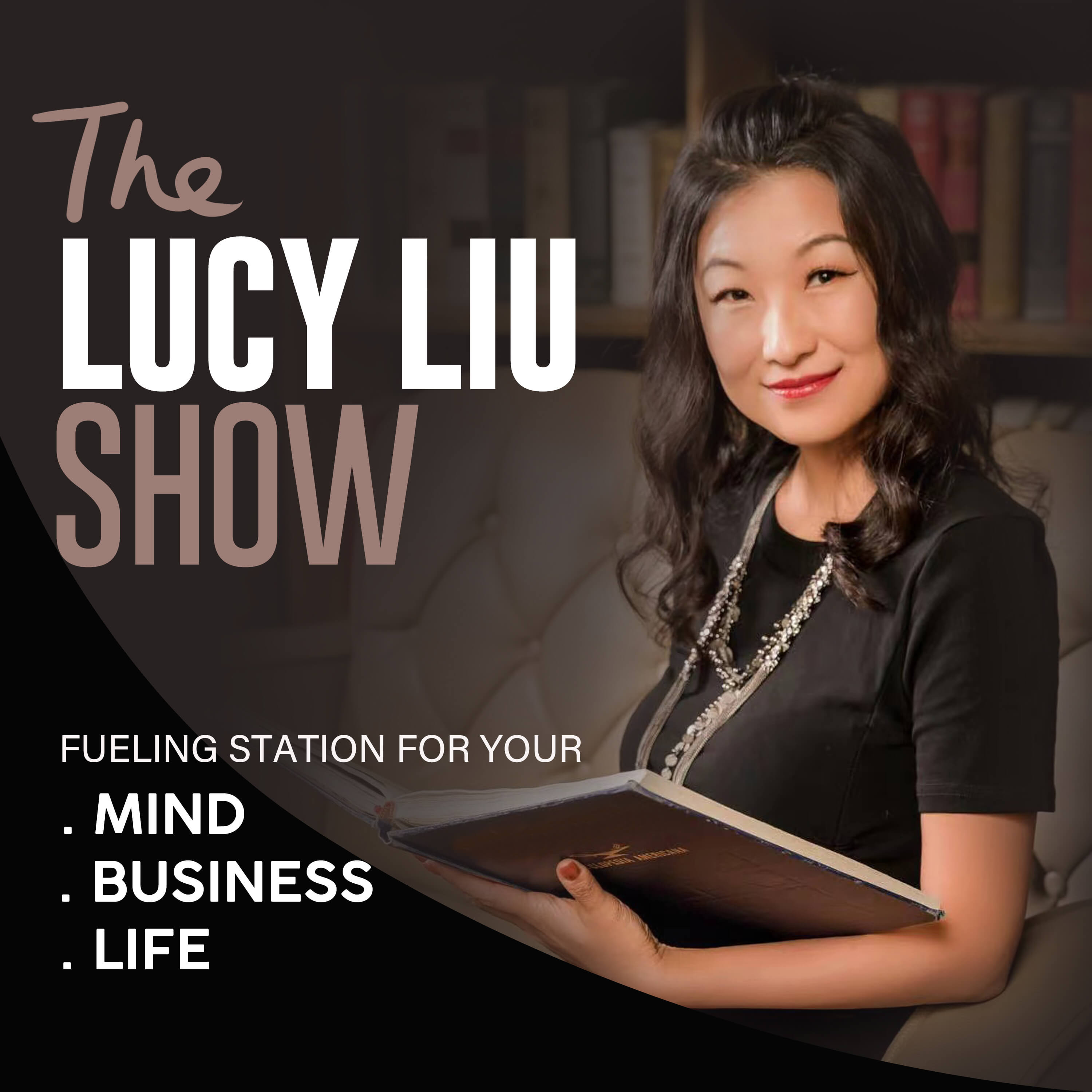
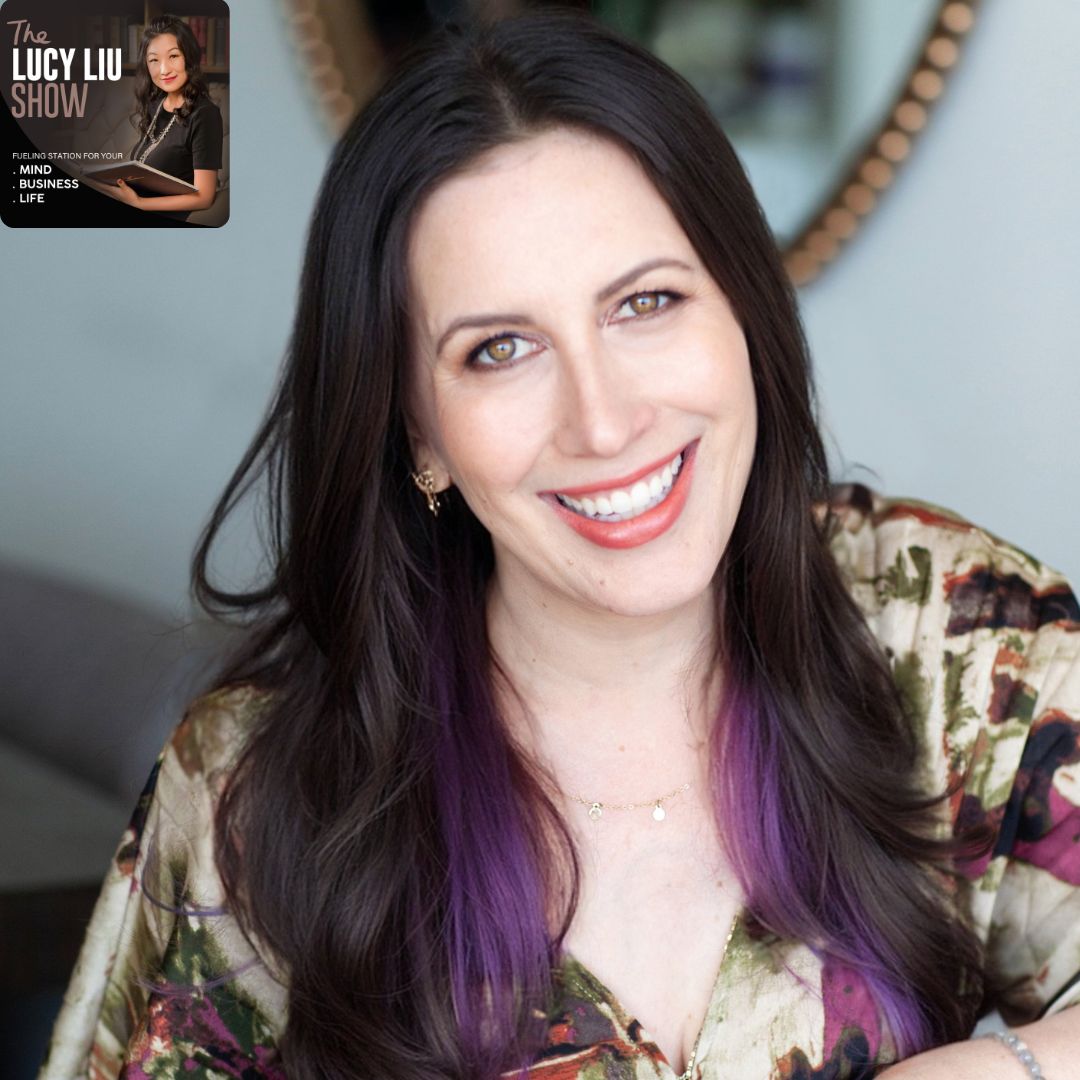
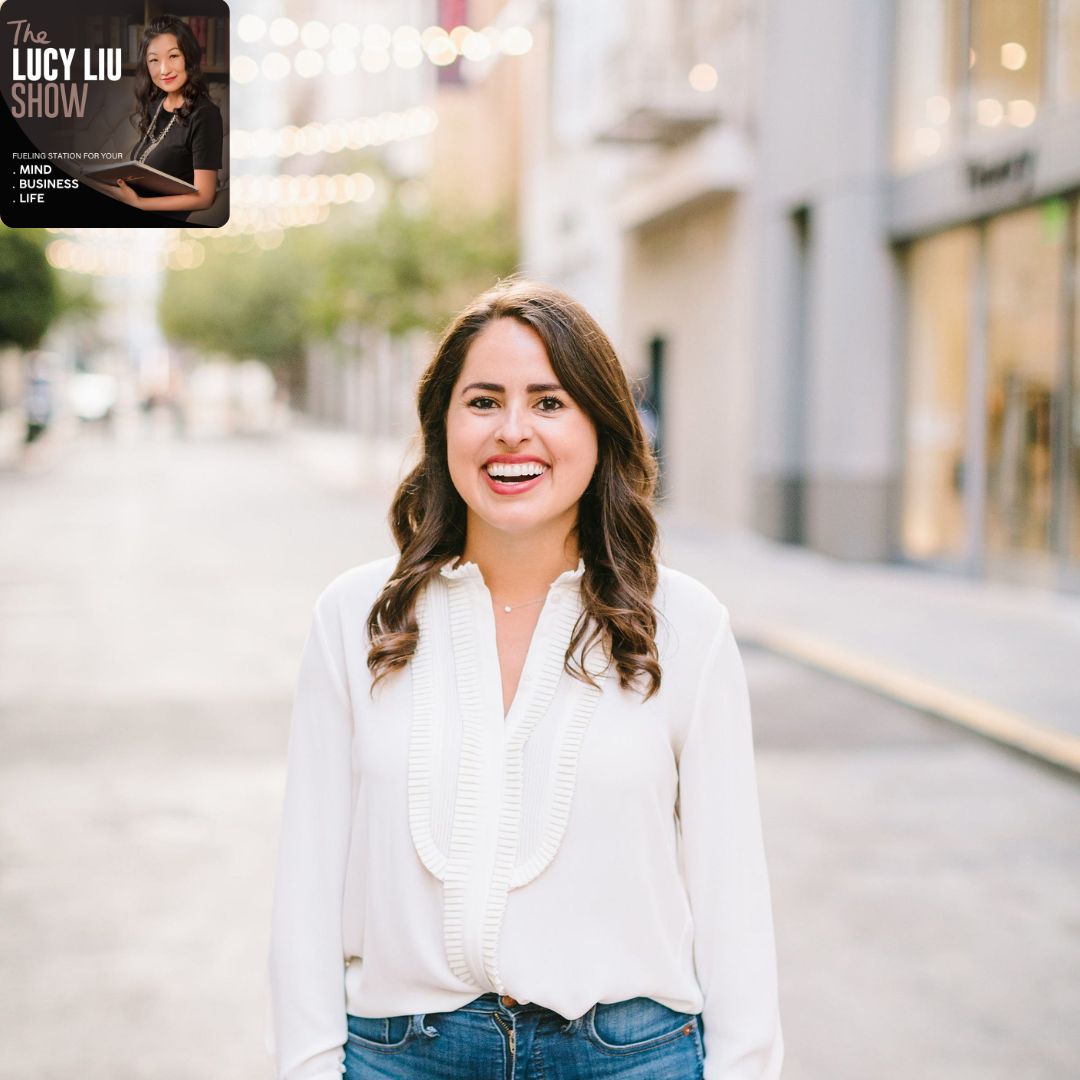
 Lucy Liu is a master life coach helping women uplevel in business and life to confidently live an epic life! She is an unshakable optimist, wife, mom, entrepreneur, workshop facilitator, motivational speaker, best selling author and podcast host of The Lucy Liu Show.
Entrepreneurs & high achievers hire her to see clarity and take quantum leaps FAST. Because most of them are overthinking, scattered and self-doubting. She's best at helping you get unstuck, make faster decisions and fulfill higher potential. Bottom line: not only make more money and impact, but have more fun and live an EPIC life by design.
She has been featured in Medium, VoyageLA, Elephant Journal, ThriveGlobal, South China Morning Post and dozens of other media outlets.
Lucy Liu is a master life coach helping women uplevel in business and life to confidently live an epic life! She is an unshakable optimist, wife, mom, entrepreneur, workshop facilitator, motivational speaker, best selling author and podcast host of The Lucy Liu Show.
Entrepreneurs & high achievers hire her to see clarity and take quantum leaps FAST. Because most of them are overthinking, scattered and self-doubting. She's best at helping you get unstuck, make faster decisions and fulfill higher potential. Bottom line: not only make more money and impact, but have more fun and live an EPIC life by design.
She has been featured in Medium, VoyageLA, Elephant Journal, ThriveGlobal, South China Morning Post and dozens of other media outlets. 


